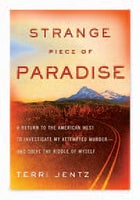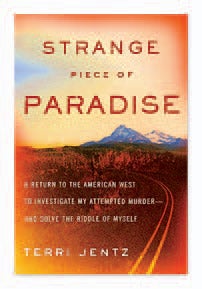Whiteman
By Our Contributors
Sebastian Junger, whose 1997 bestseller The Perfect Storm began as a story in ���ϳԹ���‘s October 1994 issue, turns to true crime in A Death in Belmont (W.W. Norton, ), the chronicle of a 1963 Boston Strangler–like murder in Massachusetts—and the uncomfortably close connection between the killer and Junger’s own family. Meanwhile, ���ϳԹ��� managing editor Katie Arnold and writers Sara Corbett and Dimity McDowell contribute essays about Labs, weimaraners, and the odd hyena to Woman’s Best Friend (Seal Press, ).Strange Piece of Paradise

By Tony D’Souza
(Harcourt, $22)
Moonlight Hotel
By Scott Anderson
(Doubleday, $25)
IS IT POSSIBLE TO KNOW any country not one’s own? That question lies at the heart of two new novels about expatriates in over their heads in faraway lands. Whiteman, the debut book from Florida-based writer Tony D’Souza, is an exquisitely crafted tale of an American aid worker in a remote West African village. Chicago native Jack Diaz volunteers to work with a group called Potable Water International and arrives in the Ivory Coast ready to change the world. But he quickly realizes that “not one thing I’d learned in training would have a practical application in this place.” PWI’s funding dries up, so he simply hangs out for two years, learning to farm and hunt and flirt with the local ladies. Against a backdrop of escalating violence between the country’s Muslim and Christian factions, Jack weaves himself into the fabric of village life, even as he realizes that his status as a “whiteman,” a one-word term with all the weight of “alien,” will never change. “No matter that I lived with them as they did and was ready some days to take up arms with my friends, to stand with them as though their families and grievances were my own, this was a place I did not belong and, more than that, a place where they would not let me belong.” D’Souza’s chapters unfold with the simplicity and grace of Raymond Carver’s short stories. Each is full of the kind of insight, humor, and difficult truth that bespeaks hard experience: The author himself worked for the Peace Corps in the Ivory Coast—and when civil war broke out in 2002, he walked the length of the country to safety.
There’s no arguing with Scott Anderson’s hard experience. One half of the world’s most tenacious pair of sibling war reporters—brother Jon Lee Anderson writes about hot zones for The New Yorker—Anderson has covered conflicts from Sudan to Sarajevo. In Moonlight Hotel, his third novel, he puts that expertise to good use by telling the story of David Richards, a midlevel American diplomat stuck in the fictional Middle Eastern kingdom of Kutar in the early eighties. This backwater posting suddenly becomes interesting when a rebel army—a sort of Middle Eastern Khmer Rouge—takes over the country and orders all foreigners to leave. Richards and a motley crew of diplomats, journos, and a batty contessa retreat to a faded resort—the Moonlight Hotel—determined to see the conflict through. Anderson knows his expat culture. The comments between Americans and others are deliciously loaded, as when Richards teases his UK counterpart for leaving documents strewn about the abandoned embassy. “We cleaned our place out completely,” he says. “Yes, well,” the Brit replies, “you people have rather more secrets to keep, don’t you?” Anderson captures the bitter poignancy of foreigners who embrace an exotic land and find their love, and their expectations, unreturned and disappointed. “It is a shocking thing,” he writes, “to discover that every understanding you’ve come to about a place and its people is in error, that all the wisdoms and truths gathered over a lifetime of studying and observing [are] shown to be false.”—Bruce Barcott
The Omnivore’s Dilemma
A Natural History of Four Meals
By Michael Pollan
(The Penguin Press, $27)
When it comes to food, Americans have entered into a state of willful amnesia. Of course we’ve heard that industrial farms are nasty, but do we really want to know that one of the 38 ingredients in a McNugget is a form of butane lighter fluid? Pollan is such a fresh and compelling writer that we’re willing to let him open our eyes. In 2001’s The Botany of Desire, he explored the fascinating history of humans’ relationship with plants. Now he follows four contemporary meals from field to table. In examining the roots of a fast-food-cheeseburger dinner eaten in a car (as are 19 percent of American meals), he tracks a single steer from its windblown South Dakota range to a crowded feedlot “city” in western Kansas, where our bovine hero is stuffed with America’s cheapest feed: corn. Corn, Pollan finds, is his story’s villain. Used as an additive in everything from milk shakes to fries, its cultivation has led to a chain of problems, including massive fuel consumption in its distribution, fertilizer-related nitrogen pollution, and, thanks to high-fructose corn syrup, an epidemic of obesity-related diseases. “Folly in the getting of our food is nothing new. And yet,” he writes, “we are today taking unprecedented risks with our health and the health of the natural world.” Searching for alternatives, he wanders the aisles of a Whole Foods Market, visits a “beyond organic” Virginia farm, and hunts and prepares his own wild boar. Along the way, he confronts thorny ethical questions, yet ultimately the book is more about human pleasure than guilt. “To eat with a fuller consciousness of all that is at stake might sound like a burden,” Pollan concludes, “but in practice few things in life afford quite as much satisfaction.” —Florence Williams
Rock On
Australian photographer Simon Carter spent the past five years shooting world-class climbers on spectacular rock—from Lynn Hill on Australia’s iconic Totem Pole to Leo Houlding deep-water- soloing 50 feet above roiling Croatian seas. The resulting 230 pictures, collected in World Climbing: Images from the Edge ($40; ), capture a vitality rarely seen in climbing photography. Here, Monique Forestier hangs out on Australia’s Mount Arapiles.

